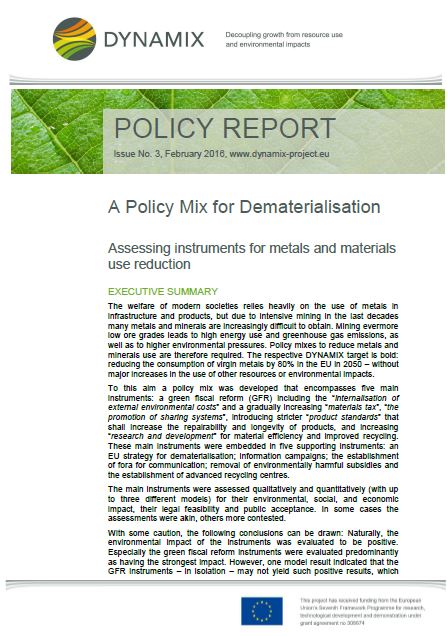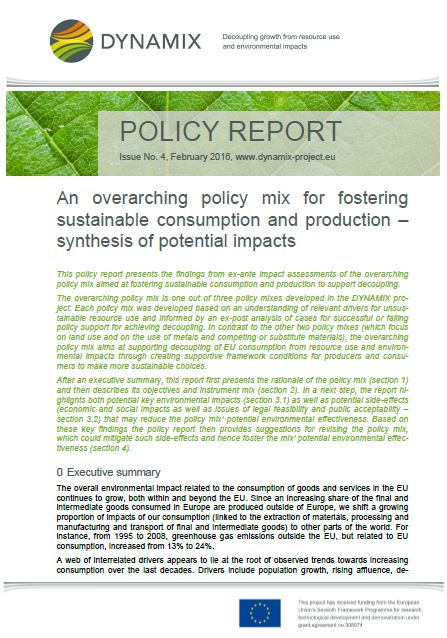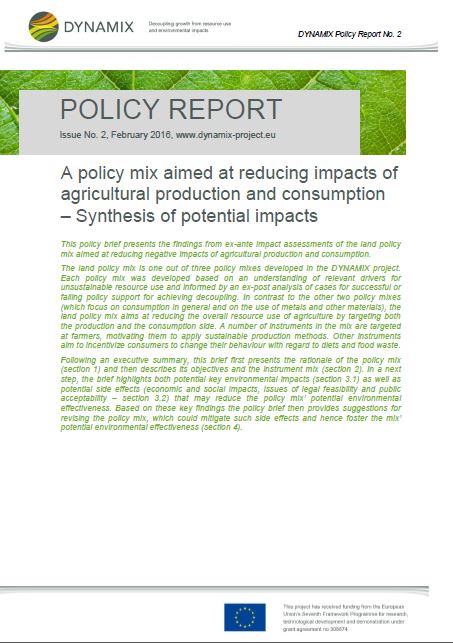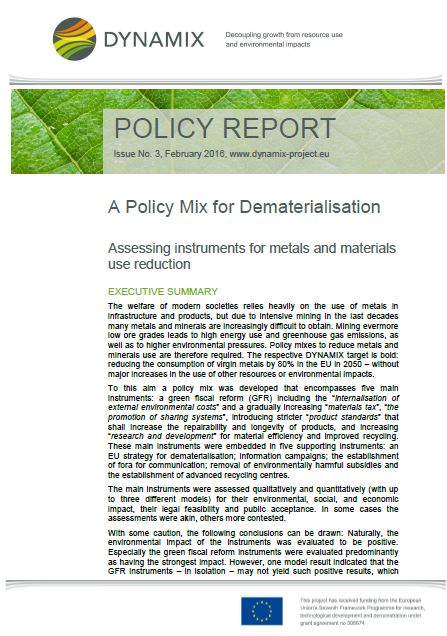As part of the DYNAMIX project, another three policy reports that synthesised the assessments of three policy mixes (a land use policy mix; a metals and materials use policy mix; and an overarching policy mix) were written in order to support the pathway to absolute decoupling in the EU:
- A report "A policy mix aimed at reducing impacts of agricultural production and consumption – Synthesis of potential impacts",
- A report "A Policy Mix for Dematerialisation. Assessing instruments for metals and materials use reduction", and
- A report "An overarching policy mix for fostering sustainable consumption and production – synthesis of potential impacts".
These policy mixes were designed to specifically address the use of virgin metals, the use of arable land and freshwater, the input of the nutrients nitrogen and phosphorus and emissions of greenhouse gases. All policy mixes were assessed combining qualitative and quantitative methods in order to estimate their potential in reaching the given objectives and targets and identify side-effects or trade-offs.
Policy Brief No.2: Land use policy mix
The policy mix aimed at reducing land use, freshwater use and nutrient surplus through improvements in food production, changes in diet and reductions in food waste. This policy mix emphasizes five instruments (revision of the Common Agricultural Policy; measures limiting nitrogen emissions; regulation for land use, land use change and forestry; improved pesticide management; and promotion of payment for ecosystem services programmes) to improve food production. Three instruments were suggested for the consumption side to change dietary habits (a value added tax on meat products; targeted information campaigns on changing diets and on food waste; and the development of food redistribution programmes).
Read more...
Policy Brief No.3: Metals use policy mix
This policy mix aimed at reducing the consumption of virgin metals by 80% in the EU in 2050 – without major increases in the use of other resources or environmental impacts. Five main instruments to reach this target were assessed: a green fiscal reform including the "internalisation of external environmental costs" and a gradually increasing "materials tax", "the promotion of sharing systems", introducing stricter "product standards" that increase the reparability and longevity of products, and increasing "research and development" for material efficiency and improved recycling.
Read more...
Policy Brief No.4: Overarching policy mix
The policy mix focused on the reduction of overall resource consumption in the EU and also on reducing the emissions of greenhouse gases and other pollutants. This policy mix included a broad variety of instruments: (1) Labour market reform fostering a shift from consumption to leisure, (2) Step-by-step restriction of advertisement and marketing, (3) Boosting Extended Producer Responsibility schemes, (4) Tax on material use, incineration and landfilling (circular economy tax trio), Price incentives for resource-efficient products through (5) feebates and (6) VAT reductions, (7) Skill enhancement programme and (8) Support for local currencies.
Read more...
Despite the differences encountered in the multiple assessments, the policy mixes, altogether, have positive results in the environmental and economic models used for ex-ante assessment. These results are mainly due to the existence of supportive instruments in the mixes to reduce barriers as well as negative side-effects on competitiveness, economic growth and employment. However, the qualitative and quantitative analysis also indicated that further measures need to be taken to achieve the predefined environmental targets, especially with regards to the land use policy mix and the overarching policy mix.
Other publications of the project include a Synthesis Brief, the results of each qualitative and quantitative assessment and a Synthesis Report.
The policy briefs are available in English.






